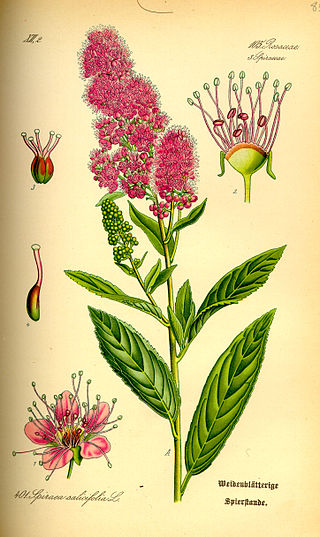
Spiraea, sometimes spelled spirea in common names, and commonly known as meadowsweets or steeplebushes, is a genus of about 80 to 100 species of shrubs in the family Rosaceae. They are native to the temperate Northern Hemisphere, with the greatest diversity in eastern Asia.
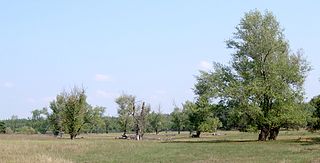
Populus nigra, the black poplar, is a species of cottonwood poplar, the type species of section Aigeiros of the genus Populus, native to Europe, southwest and central Asia, and northwest Africa.

Spiraea douglasii is a species of flowering plant in the rose family native to western North America. Common names include hardhack,hardhack steeplebush, Douglas' spirea, douglasspirea, steeplebush, and rose spirea.
1091 Spiraea, provisional designation 1928 DT, is a carbonaceous Cybele asteroid from the outer regions of the asteroid belt, approximately 36 kilometers in diameter. It was discovered on 26 February 1928, by astronomer Karl Reinmuth at the Heidelberg-Königstuhl State Observatory in southwest Germany. The asteroid was named after Spiraea, a genus of plants.

Spiraea japonica, the Japanese meadowsweet or Japanese spiraea, is a plant in the family Rosaceae.
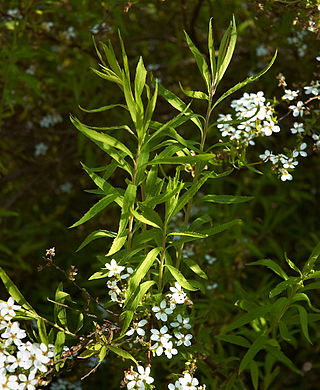
Spiraea thunbergii (珍珠绣线菊), Thunberg spiraea or Thunberg's meadowsweet, is a species of flowering plant in the rose family, native to East China and Japan, and widely cultivated elsewhere.

Sorbaria is a genus of around four species of flowering plants belonging to the family Rosaceae.
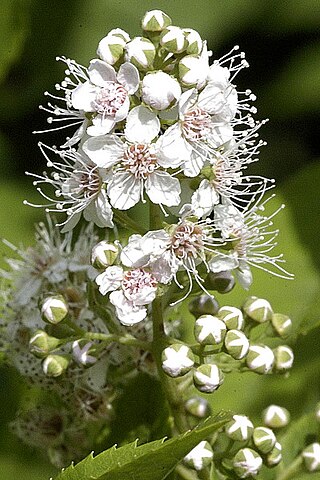
Spiraea alba, commonly known as meadowsweet, white meadowsweet, narrowleaf meadowsweet, pale bridewort, or pipestem, is native to the wet soils of the Allegheny Mountains and other portions of eastern North America, but is currently endangered in the state of Missouri. It is naturalized in other parts of the world.
Vitis betulifolia is a widely ranging species of liana in the grape family native to China where its habitat is forested or shrubby valleys and hillsides, at elevations from 600 to 3,600 metres.

Spiraea virginiana is a rare species of flowering plant in the rose family (Rosaceae) known by the common names Virginia meadowsweet and Virginia spiraea. It is native to the southern Appalachian Mountains, where it has a distribution scattered across nine states. However, most populations are very small and poor in quality. It is threatened by disturbances in the hydrology of its habitat, introduced species of plants, and other threats. It is a federally listed threatened species of the United States.

Physocarpus malvaceus is a species of flowering plant in the rose family known by the common name mallow ninebark. It is native to western North America.
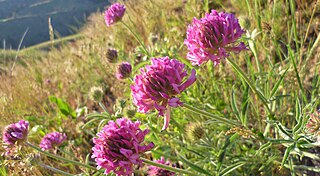
Trifolium thompsonii is a species of flowering plant in the legume family known by the common name Thompson's clover. It is endemic to Washington state in the United States, where it occurs in two counties. One of the largest populations occurs in the Entiat Slopes Natural Area Preserve in Chelan County.

Choristoneura evanidana is a species of moth of the family Tortricidae. It is found in the Russian Far East, Korea and China.

Epinotia contrariana is a species of moth of the family Tortricidae. It is found in China, Mongolia, Korea, Japan and the Russian Far East.

Campanula betulifolia, the birch-leaved bellflower, is a flowering plant in the family Campanulaceae, native to Turkey, where it grows in crevices in volcanic cliffs. The plant was named in 1850 by the German botanist Karl Koch, following plant-collecting expeditions to the Caucasus.

Pyrus betulifolia, known as the birchleaf pear in English and tang li in Chinese, is a deciduous wild pear tree native to the leafy forests of northern and central China and Tibet. It can grow 10 meters high in optimal conditions. Formidable thorns protect its leaves from predation. These narrow and extended leaves, resembling smaller birch leaves, provide it with its specific name betulifolia, meaning "birch leaf". Its small fruit are used as ingredients in types of rice wine in China and sake in Japan. It is used as rootstock for grafting popular Asian pear varieties.

Spiraea trilobata, known as Asian meadowsweet, is a species of flowering plant in the family Rosaceae. It was first formally named in 1771. Spiraea trilobata is native to Asia. It has occasionally naturalized in the United States.

Spiraea salicifolia, the bridewort, willow-leaved meadowsweet, spice hardhack, or Aaron's beard, is a species of flowering plant in the family Rosaceae. A shrub, it is native to east-central Europe, Kazakhstan, all of Siberia, the Russian Far East, Mongolia, northern China, Korea, and Japan, and it has been widely introduced to the rest of Europe and to eastern North America. It has been cultivated since the 1500s for hedges and similar applications, but is not particularly well-behaved.
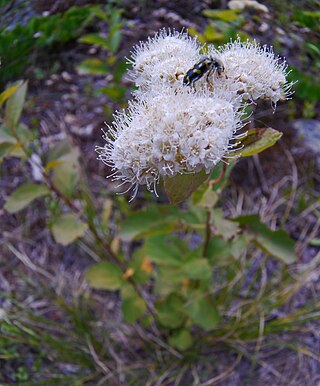
Spiraea lucida, the shiny-leaf meadowsweet, is a species of flowering plant in the family Rosaceae, native to western Canada as far as Saskatchewan, and the northwestern United States as far as the Dakotas. In the past, due to its leaf morphology varying greatly because of the plants' tendency to die back to the ground in winter, it was considered a variety of Spiraea betulifolia, the white or birch-leaf meadowsweet.

















